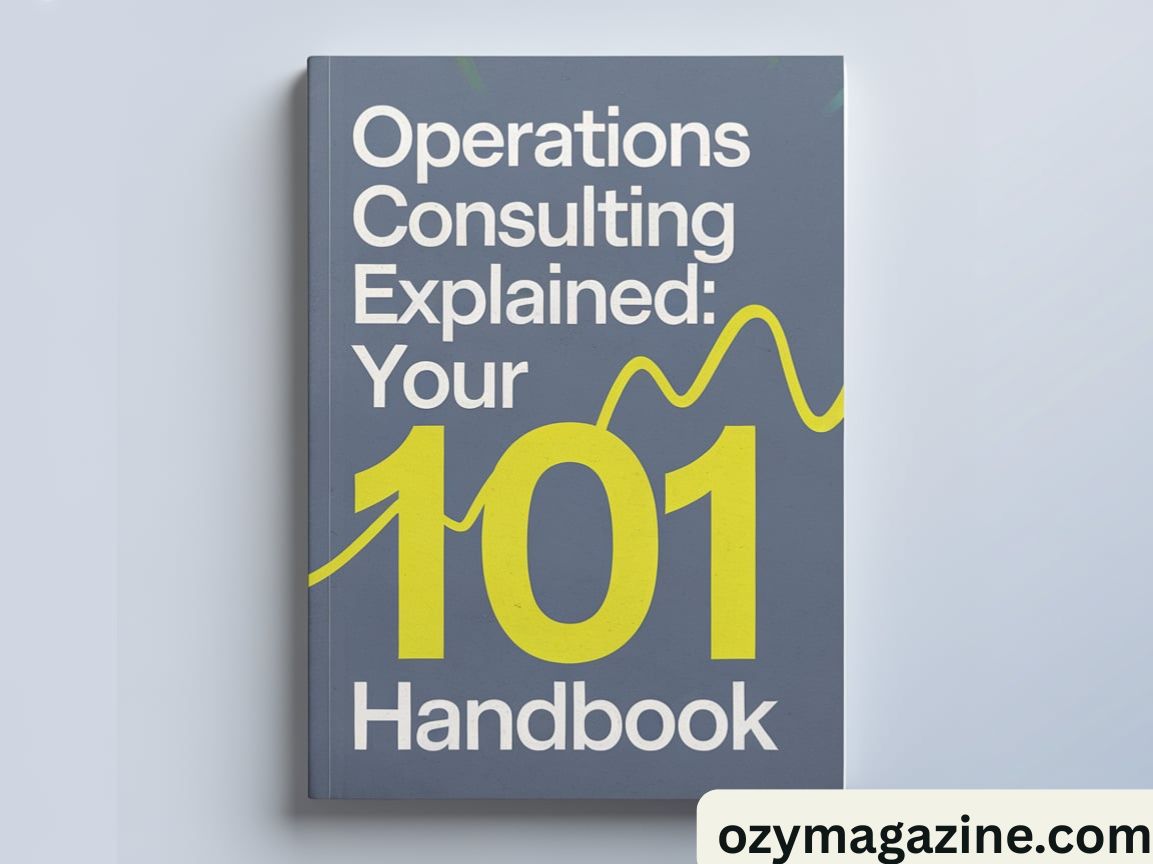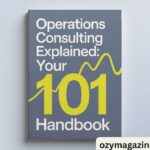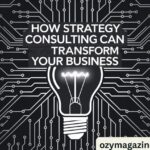Operations Consulting Explained is about making business operations better. It helps companies work faster, smarter, and with fewer costs. Consultants study processes and find ways to improve them.
Every business wants to save money and grow faster. That is where operations consulting comes in. It gives clear steps that bring real change.
In the U.S., operations consulting is used in many industries. It improves supply chains, workflows, and customer service. It also helps companies use new technology.
What is Operations Consulting?

Operations consulting is a branch of management consulting that focuses on improving the internal operations of a company. Unlike strategy consulting, which looks at long-term vision, operations consulting deals directly with processes, systems, and resources. It helps businesses identify inefficiencies and find practical solutions to make daily operations smoother. In the U.S., companies often rely on operations consultants to optimize costs while maintaining high-quality standards.
For example, a retail chain may hire an operations consultant to redesign its inventory management system so that products are delivered on time without overstocking. This hands-on approach ensures that operations consulting directly impacts profitability and customer satisfaction.
Key Focus Areas
Operations consulting in the United States covers several important areas that shape the success of organizations. Process improvement is one of the most common areas, where consultants evaluate workflows and eliminate bottlenecks that slow down production or service delivery. Supply chain management is another key focus, particularly in industries like e-commerce, logistics, and healthcare, where efficient delivery can make or break a business. Cost reduction strategies are also central, with consultants analyzing spending patterns and recommending ways to reduce waste.
In today’s digital economy, consultants are also responsible for helping companies adopt advanced technologies, from automation to artificial intelligence. Finally, sustainability has become a growing focus, with consultants guiding firms to align operations with environmental and social responsibility goals while still remaining profitable.
Typical Projects
A typical operations consulting project in the U.S. involves detailed analysis, redesign, and implementation. For instance, a hospital may hire consultants to improve patient flow, reducing waiting times while maintaining quality care. In manufacturing, consultants might be tasked with reducing production costs by applying Lean Six Sigma methodologies. Retail companies often rely on consultants to optimize supply chains, ensuring that products are available on shelves at the right time without excess storage costs.
To illustrate the results, consider this case. A mid-sized U.S. logistics company worked with operations consultants to restructure its delivery system. By analyzing route efficiency and implementing new scheduling software, the company reduced delivery times by 30% and cut fuel costs by 20% within six months. Such projects highlight how operations consulting provides measurable improvements that directly benefit both the company and its customers.
Value Proposition
The value proposition of operations consulting lies in its ability to deliver tangible business results. Companies invest in consulting services because they expect measurable returns in areas such as efficiency, cost savings, and revenue growth. By bringing in outside expertise, U.S. firms gain access to specialized knowledge and proven frameworks that they may not have internally.
Beyond cost reduction, operations consulting helps businesses improve scalability, ensuring that they can handle growth without compromising service quality. Customer satisfaction also increases because processes run more smoothly, leading to faster delivery, better product quality, and fewer errors. In a competitive market like the U.S., these benefits often determine whether a company can maintain its position or lose ground to rivals.
Top Operations Consulting Firms
The operations consulting industry in the United States is dominated by both global giants and smaller, specialized players. Large multinational firms bring global expertise and resources, while boutique firms and industry specialists offer highly tailored solutions. Understanding these categories helps businesses choose the right partner based on their unique needs.
Big 3 Consulting Firms
The Big 3 firms—McKinsey & Company, Boston Consulting Group (BCG), and Bain & Company—are at the forefront of operations consulting in the U.S. They work with Fortune 500 companies and government agencies, offering a blend of strategic advice and operational improvement. These firms are known for their global reach, deep industry research, and ability to handle complex, large-scale projects. McKinsey, for example, is famous for its work in digital transformation, while BCG focuses heavily on sustainability and operational strategy. Bain, on the other hand, emphasizes results-oriented execution alongside strategy.
Boutique Firms
While the Big 3 dominate headlines, boutique firms play an equally important role. These firms, often smaller and more specialized, provide customized solutions that larger firms may not offer. For example, a boutique operations consulting firm in the U.S. might focus exclusively on supply chain optimization for e-commerce companies. Their size allows them to offer flexible pricing, personalized service, and quicker turnaround times. Businesses that prefer hands-on consulting often find boutique firms to be the right fit.
Industry Specialists
Industry specialists are firms that serve specific sectors such as healthcare, energy, retail, or logistics. They bring deep expertise in the challenges unique to these industries. For example, a healthcare operations consultant may focus on patient flow optimization and compliance with U.S. healthcare regulations, while an energy industry consultant may specialize in operational efficiency and sustainability. By combining industry knowledge with operational expertise, these firms provide solutions that address both regulatory requirements and competitive pressures.
Career Path in Operations Consulting
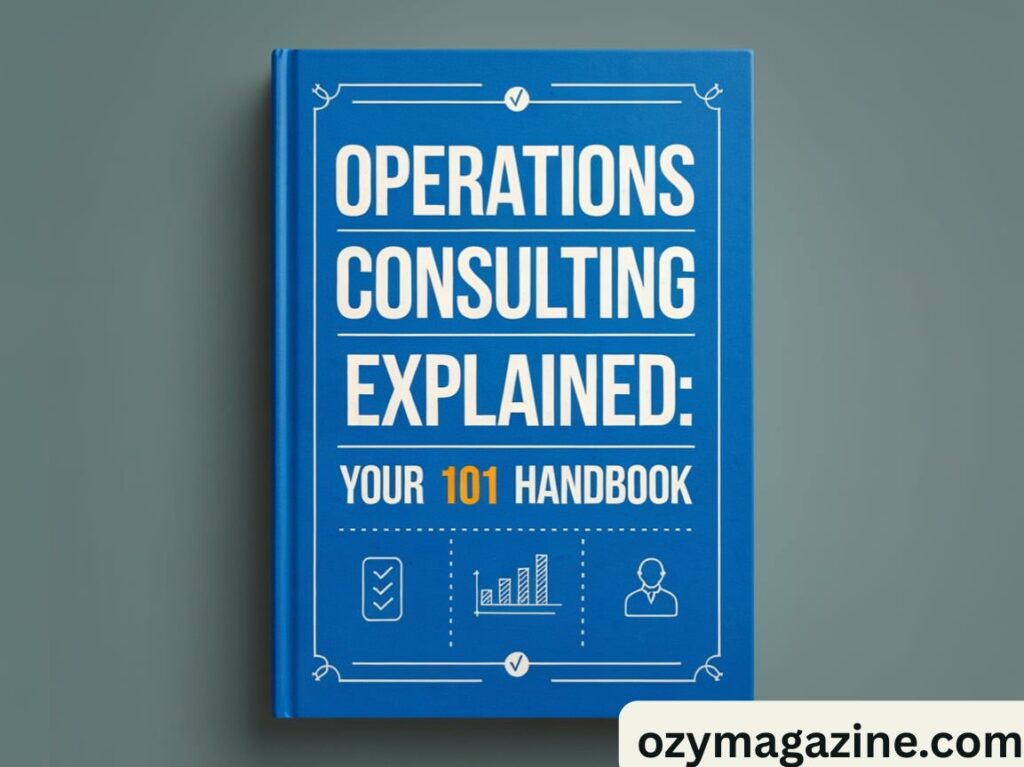
Operations consulting is also an attractive career path, especially in the U.S., where demand for consultants continues to grow. The profession offers opportunities to work with leading companies, solve complex problems, and earn competitive salaries. Many consultants enjoy the variety of projects and the chance to make a measurable impact on businesses. For ambitious professionals, operations consulting provides a fast-paced career with excellent growth prospects.
Education Requirements
Most operations consultants hold degrees in business, economics, engineering, or supply chain management. In the U.S., many consultants also pursue an MBA from top universities to increase their chances of joining prestigious firms. Specialized certifications, such as Lean Six Sigma or PMP (Project Management Professional), also strengthen a candidate’s profile. These qualifications demonstrate expertise in process improvement and project execution, two skills highly valued by consulting firms.
Skills Needed
To succeed in operations consulting, a professional needs a combination of technical and soft skills. Analytical ability is critical because consultants spend much of their time interpreting data and finding patterns. Strong project management skills help consultants implement solutions effectively and on time. Communication skills are equally important, as consultants must explain complex solutions in a way that clients can understand and act upon. In today’s digital-first economy, familiarity with tools such as ERP systems, data analytics platforms, and automation software is also becoming essential.
Typical Career Progression
A career in operations consulting typically starts with entry-level roles such as analyst or associate, where professionals focus on research and data analysis. With experience, they progress to consultant and senior consultant positions, taking on more responsibility for client interactions and project management. Mid-level roles such as manager or project leader involve overseeing teams and larger client engagements. Senior roles include director or partner, where consultants focus on winning new business and shaping firm strategy. In U.S. consulting firms, this progression can take anywhere from 8 to 15 years depending on performance and firm size.
Read Also : Pedro Vaz Paulo – Your Trusted Consultant for Business Success
The Role of Operations Consulting in Modern Business
Operations consulting is more than just improving efficiency; it is about reshaping how organizations function in a competitive market. In the United States, companies increasingly rely on consultants to navigate supply chain disruptions, reduce costs, and adapt to rapid technological changes. By identifying inefficiencies and offering actionable solutions, operations consultants help firms stay relevant and competitive.
Beyond cost savings, operations consulting also drives innovation and long-term sustainability. Consultants introduce digital tools, modern workflows, and data-driven decision-making strategies that allow businesses to scale operations smoothly. Whether it is a small U.S. retailer or a large multinational, operations consulting ensures that organizations are not only efficient today but also prepared for the demands of tomorrow.
Why U.S. Companies Invest in Operations Consulting
American businesses face constant pressure from rising costs, shifting customer expectations, and global competition. Operations consulting provides a structured way to meet these challenges by examining internal processes and offering clear improvements. From manufacturing plants in Detroit to healthcare networks in California, consultants create systems that maximize output without sacrificing quality or compliance.
The investment in operations consulting pays off through measurable results such as reduced waste, faster delivery, and higher customer satisfaction. Consultants provide an external perspective, which helps leaders see problems they may have overlooked. With industries across the United States embracing digital transformation, operations consulting has become a strategic necessity rather than just an optional business support service.
Operations Consulting and Digital Transformation
Digital transformation is one of the biggest areas where operations consulting adds value today. Consultants help U.S. companies adopt technologies such as automation, cloud systems, and advanced analytics. These tools not only streamline daily workflows but also provide leaders with the data they need to make better, faster decisions in an increasingly digital marketplace.
For example, an operations consultant may guide a retail company through adopting an automated inventory management system. This ensures products remain available while reducing storage costs. By integrating digital solutions into operations, consultants allow companies to save time, cut costs, and enhance customer experience, which are critical factors for success in America’s fast-paced economy.
Operations Consulting for Small and Mid-Sized Businesses
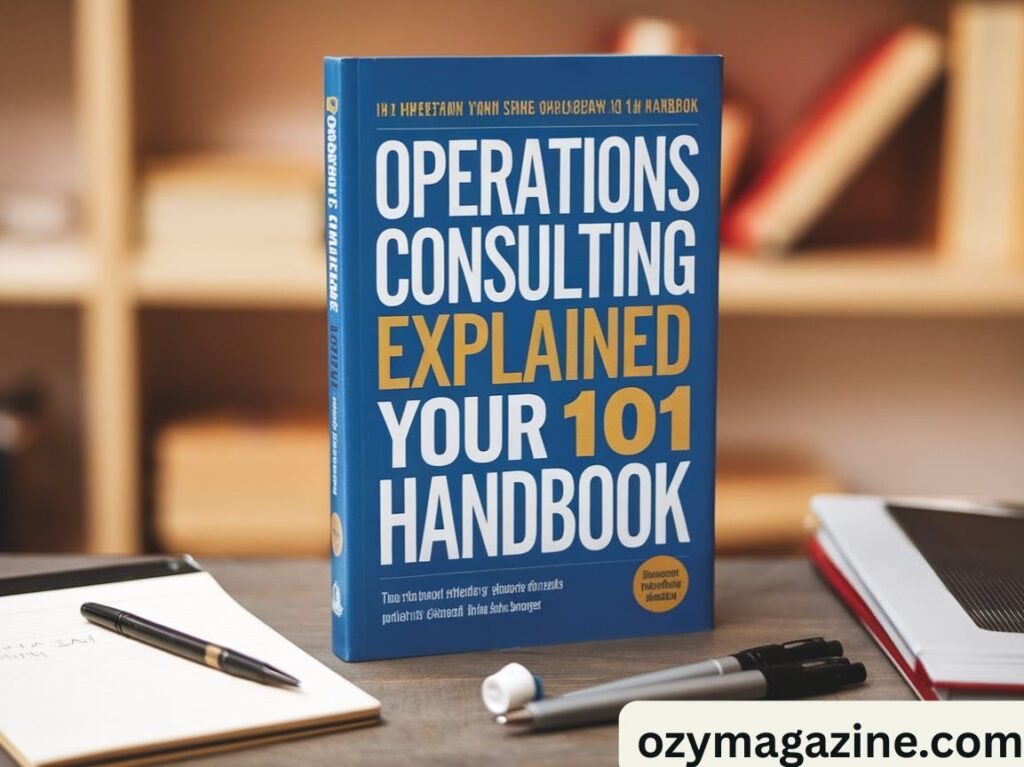
While large corporations often dominate discussions, small and mid-sized businesses in the U.S. also benefit significantly from operations consulting. These businesses usually face challenges with limited resources, inefficient processes, or lack of advanced technology. Consultants provide affordable and tailored solutions that help smaller companies compete with larger rivals on both quality and efficiency.
For example, a small logistics company may work with consultants to optimize delivery routes and adopt new scheduling tools. This can reduce fuel costs and improve customer satisfaction. By offering practical, scalable solutions, operations consultants empower smaller U.S. firms to grow sustainably, strengthen market presence, and remain resilient against the pressures of larger competitors.
The Future of Operations Consulting in the U.S.
The future of operations consulting in the United States is closely tied to innovation, sustainability, and data-driven decision-making. As industries embrace artificial intelligence, machine learning, and automation, consultants will play an even bigger role in guiding adoption. Businesses will need expert advice to balance efficiency with compliance and long-term sustainability goals in an evolving marketplace.
Sustainability, in particular, will shape consulting demand as American firms aim to reduce their environmental footprint while remaining profitable. Consultants will design operational models that use fewer resources, minimize waste, and meet regulatory requirements. In this way, the future of operations consulting goes beyond profit—it positions U.S. companies to succeed responsibly in a rapidly changing world.
Conclusion
Operations consulting explained through this handbook highlights how critical the field has become in shaping the success of businesses across the United States. From improving supply chains and reducing costs to embracing digital transformation and sustainability, operations consultants provide real solutions with measurable results.
For businesses, engaging with top firms or specialized boutiques offers a path to greater efficiency and profitability. For professionals, operations consulting represents a rewarding career with growth opportunities, intellectual challenges, and the chance to influence industries. As the U.S. economy continues to evolve, operations consulting will remain a vital driver of business transformation and success.
